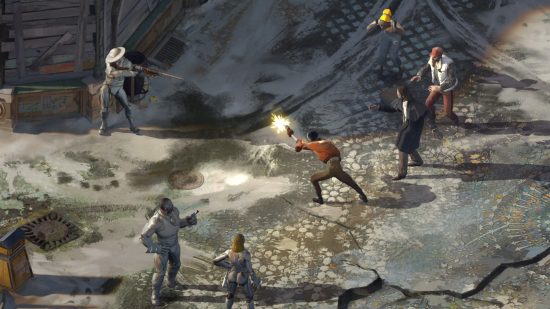Two of the principal creators of Disco Elysium have published a statement accusing the new owners of developer Studio ZA/UM of taking over the company by fraud, saying that they are now exploring legal options. Those new owners have, for their part, said that these creators were fired last year for refusing to discharge their work responsibilities and for creating a toxic work environment at the troubled RPG game studio.
In October, Studio ZA/UM cofounder Martin Luiga posted a somewhat cryptic statement on Medium titled The Dissolution of the ZA/UM Cultural Association. In it, Luiga revealed that he was no longer working at the company, and neither were cofounder and game director Robert Kurvitz, writer Helen Hindpere, or art director Aleksander Rostov. They had stopped working at ZA/UM at the end of 2021, he wrote, and said that “their leaving the company was involuntary.”
The ZA/UM Cultural Association was a distinct entity from Studio ZA/UM, the game developer – the Cultural Association was a loose collective of artists and writers whose ideas formed the basis of Disco Elysium and its world.
Under his name at the end of the note, Luiga indicated that he had written it from a psychiatric inpatient clinic in Tallinn, Estonia, and elsewhere he has said that conditions at the studio prior to his departure in late 2021 had “driven him to drink.”
In a new Medium post published November 9, Rostov writes that the majority owner of Studio ZA/UM, an Estonian investor named Margus Linnamae, was bought out of his share of the company in 2021 by a minority shareholder, another Estonian company called Tütreke OÜ. Its owners, Ilmar Kompus and Tõnis Haavel, later fired Kurvitz, Hindpere, and Rostov.
The reasons for the firing are a contentious matter. In a statement provided to GamesIndustry.biz, the studio claims the creators had effectively stopped attending to their daily work responsibilities and treated other employees disrespectfully, including subjecting them to verbal abuse and gender discrimination. The new owners also spoke with Estonian news outlet Eesti Ekspress, alleging a toxic work environment at the studio.
However, in their new Medium post, Kurvitz and Rostov claim that, shortly after taking control of the company, Kompus and Haavel excluded the original creators from daily operations and fired them a few weeks after they asked for company documents and financial information.
Kurvitz and Rostov go on to say that they believe the share buyout itself was fraudulent, and that they are discussing their legal options in both Estonia and the United Kingdom.
“Until now, we’ve refrained from speaking out. This has been entirely voluntary, out of consideration for the people still working at ZA/UM – and for our own mental health. But given the severity of our suspicions – and the seriousness of the evidence we have – we think it’s time people knew what has transpired at the company.”
In their statement to GamesIndustry.biz, ZA/UM’s new owners say the fired creators, in addition to creating a toxic workplace for other employees, also attempted to “illegally sell to other gaming companies ZA/UM’s intellectual property with the aim of undermining the rest of the team.
“ZA/UM cannot and will not tolerate egregious misconduct, even from individuals who, along with the broader team, have contributed to a game that we are exceptionally proud of and that continues to capture imaginations across the globe,” the studio’s statement reads.
“The rumour that our decision to terminate the contracts of these individuals was taken for financial gain is entirely unfounded and does not in any way reflect the facts,” the new owners continue. “It was a decision that had to be taken for the wellbeing of the collective. Further, ZA/UM denies any claim of financial malfeasance or fraud that is being held against us. The vast majority of profits from Disco Elysium have been invested back into the studio in order to fund our next projects, which are currently in development.”
PCGamesN has reached out to Rostov and to Studio ZA/UM for additional comment on the allegations and we will update this story with any response we receive.
